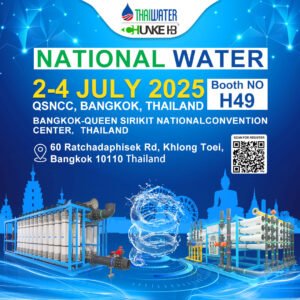Water Filter Machine is removing unwanted organic and inorganic matters from your source water. Water Filter Systems use different filtration techniques. For example, multi-media filtration, PP cartridge filters, bag filters, disk filters, reverse osmosis, ultrafiltration, electrodeionization and combination of them to gain filtered water.
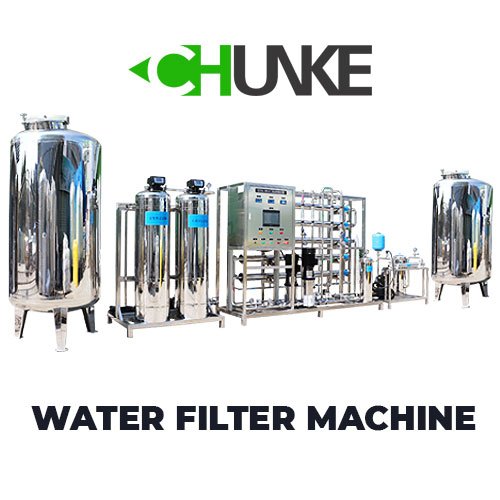
Here, we will explain all this techniques: How does water filter machine work? How to find best water filter machine producer from China? All you need information, you will find in this article.
What Does the Water Filter Machine Do?
Water Filters remove unwanted impurities from water such as sediment, taste and odour, hardness and bacteria to result in better quality water. From producing better-tasting drinking water to more specialist applications. For example, brewing coffee and making crystal clear ice, we offer a huge range of filters and cartridges to solve any number of water-related issues accordingly. Also, for industrial application, we offer big size sand filters, activated carbon filters, reverse osmosis membrane filters, ultrafiltration filters.
The 6 Types of Water Filter Machine
Subject to your application, i.e. what you’re trying to remove or in some circumstances trying to stop. There are 5 types of water filters.
1. Mechanical Filters
2. Cartridge and Bag Filters
3. Ion Exchange Filters
4. Ultrafiltration Filters
5. Reverse Osmosis Filters
6. Electrodeionization Filters
Each one of these addresses a different water problem. And many filters actually use a combination of these methods to perform multiple levels of filtration. Which method or filtration you should choose, you can get support and more details from our customer service.
1. Mechanical Filters
One of the most widely used water filter machine is mechanical filters. Chunke provide different size and material options for mechanical filters. Meanwhile, Sand Filters, Multi-media Filters, Activated Carbon Filters, Anthracite Filters, Managanese Filters are popular in water industry to remove sediments, odor, taste, chlorine, iron and other bigger particles.
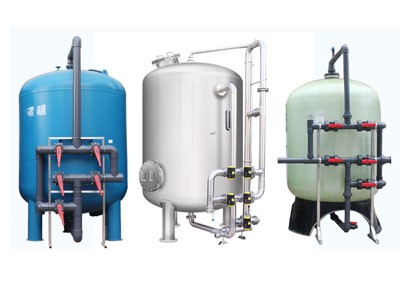
In mechanical filters, we can put Quartz Sand, Gravels, Manganese, Carbons in FRP, Stainless Steel or Carbon Steel Tanks and water pass through filter media and you can easily get clean water.
You can use filter media 1 to 2 years in water filter machine, then, you have to change media. If you take care cleaning and maintenance of tanks, you can use filter tanks very long years (10-20 years).
2. Cartridge and Bag Filters
Cartridge and bag filters are mostly used in water filter machine to remove sediments, turbidity and 1-5 micrometer size particles accordingly.
In many filtering applications, a choice between the use cartridge filter or a bag filter has to be made. Both are sediments filters, that is to say they reduce the amount of sediments transported by the fluid trough filtration.
There are some differences between these two filter systems:
The choice of cartridge filter depends on the application. So, cartridge filters are preferable for systems with contaminations lower than 100 ppm, that is to say with contamination levels lower than 0.01% in weight.
Bag filters are in general frequently used for dust removal in industrial applications. Hence, the flow can be from the outside to the inside of the filter (that means, the separation of particles happens on the external surface of the filter) or the other way around, depending on the application. The particles are normally captured on the internal surface of the bag filter.
3. Ion Exchange Filters
Ion Exchange filters, we call this type water filter machine in market as water softeners.
The ion exchange filtration is one of the most common water filter machine. Ion exchange process percolates water through bead-like spherical resin materials (ion-exchange resins). Ions in the water are exchanged for other ions fixed to the beads. The two most common ion-exchange methods are softening and deionization.
Softening is used primarily as a pretreatment method to reduce water hardness prior to reverse osmosis (RO) processing. The softeners contain beads that exchange two sodium ions for every calcium or magnesium ion removed from the “softened” water.
Deionization (DI) beads exchange either hydrogen ions for cations or hydroxyl ions for anions. The cation exchange resins, made of styrene and divinylbenzene containing sulfonic acid groups, will exchange a hydrogen ion for any cations they encounter (e.g., Na+, Ca++, Al+++). Similarly, the anion exchange resins, made of styrene and containing quaternary ammonium groups, will exchange a hydroxyl ion for any anions (e.g., Cl-). The hydrogen ion from the cation exchanger unites with the hydroxyl ion of the anion exchanger to form pure water accordingly.
If your tap water is hard, water softeners are suitble for you to use as water filter machine at home or in your process.
4. Ultrafiltration Filters
Ultrafiltration (UF) is a membrane filtration process, using hydrostatic pressure to force water through a semi-permeable membrane. The pore size of the ultrafiltration membrane is usually 103 – 106 Daltons. Ultrafiltration (UF) is a pressure-driven barrier to suspended solids, bacteria, viruses, endotoxins and other pathogens to produce water with very high purity and low silt density.
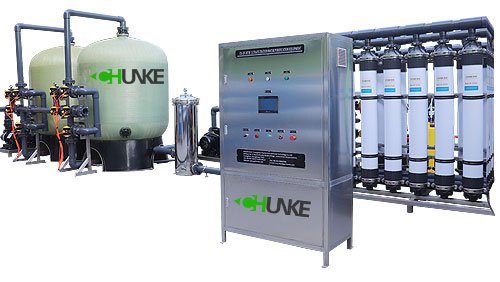
Ultrafiltration (UF) is a variety of membrane filtration in which hydrostatic pressure forces a liquid against a semi permeable membrane. Suspended solids and solutes of high molecular weight are retained, while water and low molecular weight solutes pass through the membrane. Chunke uses ultrafiltration for lower TDS water source application, because UF Filters cannot reduce TDS, but remove TSS and bigger particles in water filter machine. If your water source has lower TDS and has valuable minerals, it is eco-friendly water purifier methods to produce clean water, especially bottled water production.
5. Reverse Osmosis Filters
Reverse osmosis removes contaminants from unfiltered water, or feed water, when pressure forces it through a semipermeable membrane. Water flows from the more concentrated side (more contaminants) of the RO membrane to the less concentrated side (fewer contaminants) to provide clean drinking water. The fresh water produced is called the permeate. The concentrated water left over is called the waste or brine.
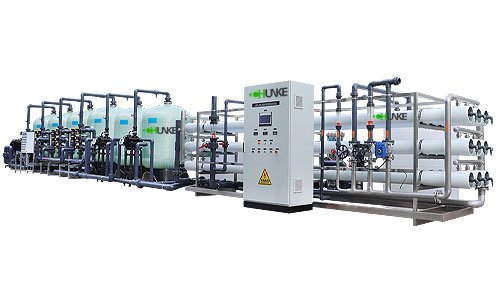
A semipermeable membrane has small pores that block contaminants but allow water molecules to flow through. In osmosis, water becomes more concentrated as it passes through the membrane to obtain equilibrium on both sides. Reverse osmosis, however, blocks contaminants from entering the less concentrated side of the membrane. For example, when pressure is applied to a volume of saltwater during reverse osmosis, the salt is left behind and only clean water flows through.
6. Electrodeionization EDI Filters
Continuous Deionization (CDI), is a chemical-free technology that significantly reduces ions in water. CEDI uses cation and/or anion exchange resins that are continuously regenerated by an electrical current. EDI modules, also called “stacks,” consist of cell pairs with each pair containing an anode and cathode on separate sides. Each cell consists of a frame onto which are bonded a cation-permeable membrane on one side, and an anion-permeable membrane on the other.
The space in the center of the cell, between the ion-selective membranes, is filled with a thin bed of ion exchange resins. The cells are separated from one another by a screen separator. The feed water entering the module is split into three parts. A small percentage flows over the electrodes, 65-75% of the feed passes through the resin beds in the cell, and the remainder passes along the screen separator between the cells.
Electrodeionization based Water Filter Machine is mostly used in pharmaceutical industry, boiler applications, power plants and electric-electronic industries.
Combination of Filtration Methods in Water Filter Machine
Each filtration method has limitations on what it can remove, so most water filters or filtration systems use a combination of methods to achieve a specific level of water purity. To give an example, household water jug filters will generally use mechanical, absorption and ion-exchange whereas inline filters will utilise mechanical and absorption with the possible inclusion of sequestration if the filter is designed to inhibit scale. Reverse osmosis systems can utilise mechanical, absorption and of course reverse osmosis depending on how many stages the RO system has.
For example, we got best result for sea water desalination system with combination of sand filter, carbon filter, ultrafiltration, cartridge filter and reverse osmosis system in water filter machine.
What is the Difference Between Water Purifier and Water Filter?
Generally speaking, a water filter is designed to remove waterborne protozoa and bacteria, but not viruses. A water purifier is designed to remove protozoa, bacteria and viruses, offering a higher level of defense. And also for commercial and industrial water filter systems, water purifier is effective on reducing Total Dissolved Solids (TDS), but water filters do not have effect on TDS.
Why do We Need Water Filter?
The main importance of water filtration is to prevent water-related illnesses and diseases for drinking water application. Infants, elderly adults, and people with poor immune systems are more highly susceptible to experiencing adverse effects due to contaminated water from the tap.
For commercial and industrial application, we need water filter machine to increase process and production quality and stablity and reduce cost. For example, in boiler application, when we use water filter machine, we reduce energy cost, or for textile process, increase dying quality and reduce chemical and energy cost.
Is Filtering Water Good for You?
Drinking filtered water lowers your risk of developing certain cancers by removing the chlorine. The list includes rectal, colon and bladder cancer. Although water filters remove the minerals that can be harmful to health, the minerals that you want to stay are kept in the water.
What Is the Cost of Water Filter Machine?
Water filter machine price is depend on your water source quality and design of water filter system. We are using different materials and different combination of water filters as we explained before. Therefore, we cannot tell to you water filter machine price or cost without seeing water analysis report and your application.
To get more details and if you want to get quotation for your water problem, please fill in our form. Our experienced technical sales team will contact you in 25 hours.

